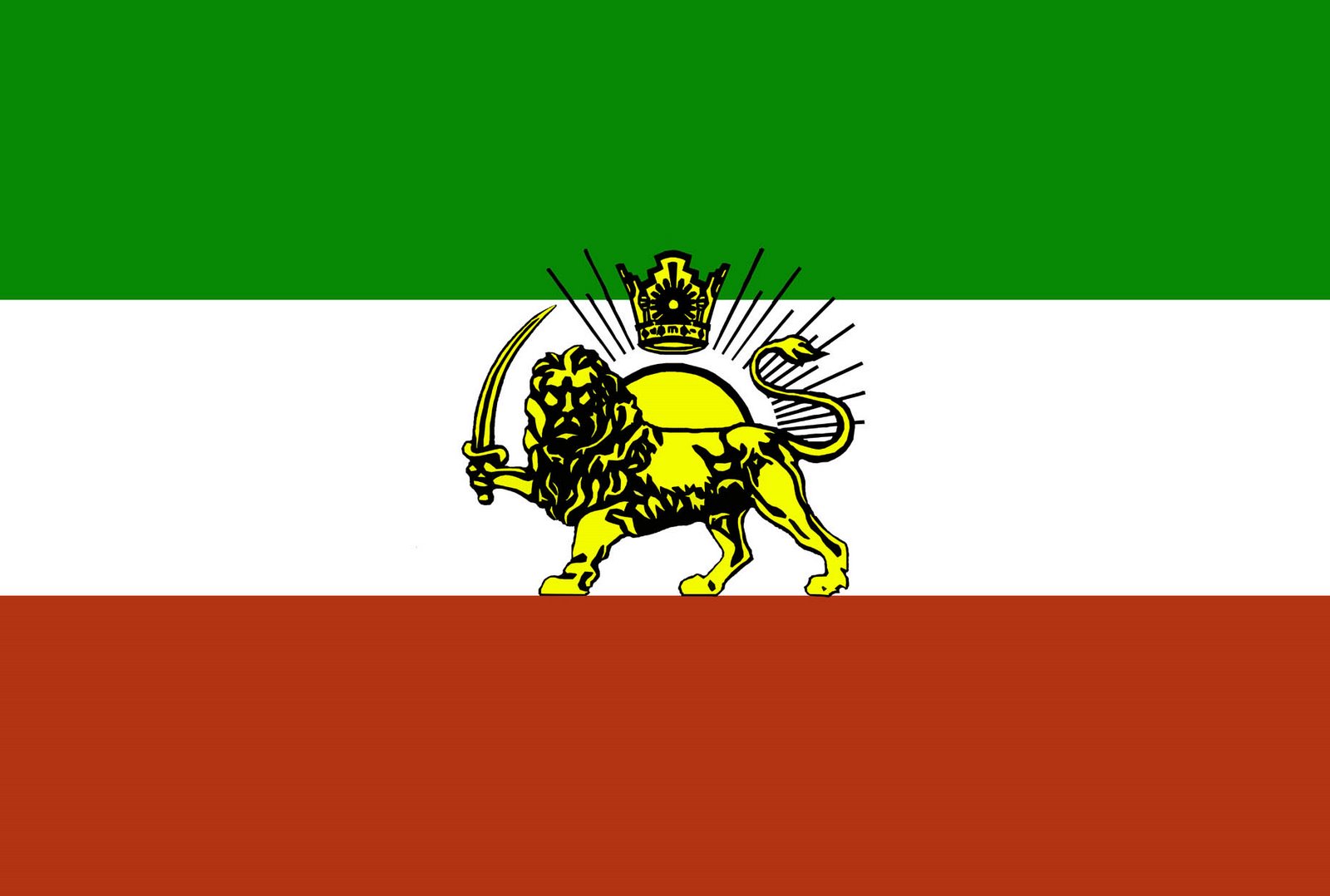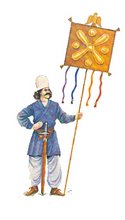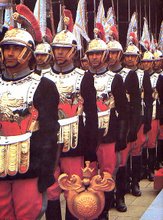UPDATE: Here is I would say an even more informative interview by the Izvestia newspaper (believe it's Russian):
Reza Pahalavi: "No War Is Needed - We Will Topple This Regime Ourselves"
Below is the Wall Street Journal interview:
Reza Pahlavi Royal Democrat
June 03, 2006
The Wall Street Journal
NAncy Dewolf Smith
It's been an agonizing week for Iranian patriots. On Monday, Washington's ambassador to the U.N., John Bolton, suggested that if Iran's ruling clerics abandon efforts to make nuclear weapons, they can remain in power. Thursday brought another jolt, when U.S. Secretary of State Condoleezza Rice said that the U.S. would join direct negotiations with Tehran if Iran verifiably halt its weapons program.
In one fell swoop, it seems, the U.S. not only committed itself to a course that is certain to fail. It blundered into the one strategy guaranteed to strengthen the revolutionary regime while simultaneously undercutting the only force capable of stopping it: the Iranian people themselves.
At least, that's what I thought Reza Pahlavi would say when I telephoned Thursday for a comment on Secretary Rice's statement, following up on a long conversation we had in person last week. But Mr. Pahlavi, perhaps drawing on diplomatic skills he's honed in the quarter-century since his father, the shah of Iran, was deposed in 1979, gracefully called it "overall . . . a good move by Washington." The reason? "It will once and for all force Tehran's hand," and show that "the clerical regime is irreversibly committed to its dual-use enrichment program; that it will seek to stall for time, by following a pattern of deceit and duplicity; that at the end, it will prove its untrustworthiness and incapacity to become a reliable partner in diplomacy."
But then Mr. Pahlavi brought up the alternative strategy which Iranians, at home and abroad, have been urging deaf Western policy makers to adopt for years now: "That can only be internal pressure on the regime . . . support for proponents of democracy and human rights in Iran. There is no other answer."
* * *
Mr. Pahlavi should know, and not only because he is the son of Mohammed Reza Pahlavi, who for a time made Iran the linchpin of Middle Eastern stability and set his country on a course toward modernity and prosperity. The famous name helps, but so, for instance, does the Internet. From his home in a Washington suburb where I visited him last week, Mr. Pahlavi is in constant contact with people all over his homeland, including curious students who turn to him as a link with a more liberal past and also to exchange thoughts about a democratic future.
In short, Mr. Pahlavi easily grasps what the rest of the international community refuses to understand or to acknowledge.
"There is no incentive that we can give the Islamic Republic to stand down," he told me over Memorial Day weekend. "They need to do what they're doing, first and foremost because this is a totalitarian system. It has to keep the mood on the streets in its favor by continuing this process. If they are using the slogan of enrichment as a tool to keep these people mobilized, the minute they concede, they will lose their entire praetorian guard. Therefore there's no way that they are going to concede on that point."
The threat of sanctions or the promise of aid won't budge the regime either, he says. "There is no economic incentive that you can throw at them, because you are not dealing with a conventional state, in the sense that it is ultimately accountable and responsible and cares about the citizens living in that boundary. It's not the welfare of the people that matters to them. They can send $100 million to Hamas in Palestine when people are starving on the streets of Iran. They could care less about their economic status, so long as they can fuel their own war machine.
"You cannot even offer them a security guarantee, they don't care. For them, war is a gift from God. [President] Ahmadinejad is talking about Armageddon. He's talking about paving the way for the reemergence of the 12th imam, which is coming back to the planet to bring back stability and peace after major cataclysm. They really believe that."
Until that happens, the prospect of negotiations with the U.S. is a little godsend for the regime, Mr. Pahlavi explains. Iran's rulers can say, "Look at us! We're standing against the Great Satan . . . and guess what? We have brought them to their knees, we have brought them to the table."
As for Tehran's end game, that's simple: "Ultimately, what is the grand prize for them? They would like to achieve something the Soviets never could -- the control of the Middle East. The economic lifeline of the Western world. By encircling the Persian Gulf, by institutionalizing themselves, with their proxies operating everywhere, and in a fait accompli-type scenario, force the world to reckon with them. Naturally, if they ultimately get the bomb, their deterrent will be even more dangerous."
Mr. Pahlavi, who is 45, has seen danger in his own life. He was at school in the United States when his parents left Iran, but joined them in exile and, after his father died in Egypt in 1980, became a target himself of the new regime's vilification campaign. Today, although he does not advertise his address, he doesn't surround himself with bodyguards. Inside his airy and attractive house in Maryland, pictures on a side table of his regally attired father and mother are the only obvious signs of his unique heritage.
Mr. Pahlavi is so focused on the future of Iran that he prefers not to spend time on the past. Even so, when I ask what might be different today if the Iranian revolution had never taken place, he points to a chain of events that seem even worse with hindsight than they did at the time: "The Russians probably would not have invaded Afghanistan the way they did, and Saddam Hussein would not have attacked Iran. . . . From Sudan to everywhere else you can think of, there have been acts of terrorism, attacks on apartments in Khobar, the blowing up of Marine barracks in Beirut. It's been all over the place. If you look at the world the way it was before this regime took over, we didn't have any of these problems."
And yet a solution to all of this is percolating up today, Mr. Pahlavi says, and it's coming from the Iranian people. In fact, he insists, in dealing with a belligerent Tehran, "there is only one thing that the outside world can do, and that is to tell the regime: 'We are serious about supporting the people who are inside Iran who are against you.' That is the only thing that will make Mr. Khamenei [Iran's supreme leader] and everybody stand down. Because nothing else ruffles them. The only thing they are really scared of are the people themselves."
Peaceful revolutions from within have worked before, so why, he asks, isn't the West investing in the Iranian people -- "the same way they supported so many movements in Eastern Europe that ultimately brought down communist governments that were under Moscow's umbrella?" Dissidents are everywhere, in the universities, workplaces, the conventional armed forces, he adds: "There are thousands of cells . . . each trying to bring as much pressure as they can -- but with very limited resources. Imagine the cumulative weight of all these resistance groups in a civil disobedience act -- nonviolent, we don't believe in violent change -- that could begin sustained pressure to the point of paralyzing the system until it would collapse."
* * *
It might be easy to dismiss Mr. Pahlavi as a typical pipe-dreaming exile if there weren't so much evidence from Iran of mounting popular unrest, including student demonstrations and other massive protests and labor strikes. Arguably, unrest does not automatically translate into a force for change. Like other Iranians in opposition, though, he has reason to believe that they could. People in Iran are among the world's busiest bloggers, for one thing, and many are talking their heads off to anyone who will listen:
"They want to have justice, they want to have equality, they want to have freedom of speech, they want to have a better life, they want to be connected to this progressive world, they like modernity. . . . And they know that the only obstacle between them and the free world is this regime. When you talk to young students today, they say: 'We don't have any more fears. We are out there, we are fighting -- all we need is the support and recognition because that is going to prompt even more action inside Iran.'"
Helping opponents of the regime inside Iran does seem like a smart option, especially when you look at Iraq today -- and then imagine how much better it would be if Saddam had been replaced by Iraqis who had already decided to pull together for a common cause and similar goals. It's also a far less precarious and destructive option than a military attack on the current regime or its nuclear sites.
Mr. Pahlavi is horrified by the thought, and not only because he loves his country. He can come up with plenty of other objections, beginning with the fact that Iran's top ayatollah and the rest of the regime would be the only beneficiaries: "I think Mr. Khamenei is sitting there praying and hoping that such an attack would occur. Because it would play right into their hands: They can call another jihad or it would give them every excuse in the book to deflect attention yet again [from their failings]. It would be the greatest gift you could give them."
Besides, he continues, "nobody in this world really believes that a full-scale military attack on Iran is foreseeable. Tanks marching all the way to Tehran -- impossible. Limited air strikes at best. [And] it wouldn't achieve anything except infuriate the people; . . . you would lose many nationalists, who would say: 'This is an attack on Iran, not defiance of the regime -- you want to hurt the regime, why don't you put sanctions on the regime? Keep their diplomats from traveling. Why don't you go and block and freeze all their assets and bank accounts and dummy companies that they operate through and [use to] transfer money to their cronies?'"
Why not indeed? Mr. Pahlavi says he is no enemy of diplomacy. What he can't figure out is why so much time and effort has been focused on Iran's rulers, while so little attention and support has been directed to the Iranian people. As he emphasizes every chance he gets, "It's not by sending the Sixth Fleet and annihilating the entire Iranian navy that anything is going to be achieved, not to mention the loss of lives. It's going to be by helping the people on the streets. . . . They are the best army that can fight against this evil and remove it from the planet."
By the way, Mr. Pahlavi says that in a democratic Iran, he would be honored to assume the title of shah in a parliamentary system, but only if the Iranian people ask him to. He already has at least one vote. On the way to meet him at his house, the nice lady who drove me there quite naturally referred to her boss as "His Majesty."
Ms. Smith is a member of the Journal's editorial board.










10 comments:
It's a great article!
Thanks for posting!
This is great!
"When the regime has been debunked"
"As a slang term, debunking is the act of disproval of a proposal or theory, generally in an academic or scientific sense. The term debunk originated in 1923, when American novelist William Woodward (1874-1950) used it to mean to "take the bunk out of things."
Often the term "debunkery" is not limited to arguments about scientific validity. It can also be used in a more general sense at attempts to discredit any opposing point of view, such as that of a political opponent. However, the further debunkery is removed from objective argument of fact, the more likely it is to become just another form of propaganda. The TV show (as of 2005) MythBusters debunks current urban legends and myths."
Just tell me how a dictatorship, a tyrant, a Islamic leadership is going to be run out, disposed of or de-throned by being debunked.
The only way the present "government" will be overthrown is by the force of arms of it's citizens.
Their blood must run deep and long for this to happen. There are not enough Persians, or others to make this happen.
Even if everyone of them was equipped with an AK-47, two RPGs and six bombs, this would not happen.
Why, because, for this to happen, the citizens of Iran must care more for the future of their children, grandchildren and their country than they do for their own lives.
They don't
Papa Ray
West Texas
USA
Aryamehr
I hear you but remember that today there are only two camps of Iranians.
Those who oppose the regime and those who support and agree with the regime of Mullahs.
I do think Ganji has become a regime's enemy over the years and it is his maturity to be like this.
You know what I mean? I meant that he was a regime guy but over the time he has evolved and it is a good thing if you look at it through a historical viewpoint.
I did hear him saying he thinks the regime is a goner many times in his manifestos and I do recommend that you should read them as well
Very good blog!
In djâleb ast.
What can outside powers (e.g. the U.S.) do exactly in order to help those within Iran to topple the regime??
I agree with papa ray.
1.Ganji is islamo fascist supporter and mozdor puppet lets not muddy the water with these end of line regime spies.2.I LOVE PAHLAVI THE THIRD TO RETURN TO IRAN TODAY BUT THE IRANIAN PEOPLE MUST DESTROY THIS FASCIST REGIME BY FORCE OF ARMS.THAT MEANS BLOODSHED FREEDOM COSTS LIVES ITS NOT CHEAP!THEY CANT BE VOTED OUT SO THEY MUST BE BLOWN OUT BY FORCE!!ONCE WE CLEANED THE HOUSE OUT THEN WE CAN PUT NEW STUFF IN IT.
One more thing my friends last year when millions of brave Iranian people went to the streets against this killer regime they could have taken arms from police stations and army barrecks by shear force of numbers.North Tehran has a huge arms factory alone when tens of thousands of people go against a few hundred people always win.Remember out of two million people twenty thousand need be armed with guns the rest with anything that comes at hand.It will then expand into massive force very soon with loyal soldiers to people joining.Mulla will run to hell then we have democracy!
I hate this fascist islamic regime it makes me sick thinking about it.This regime has retarded the development of Iran big time!Look at our national airline our airport named after a man who hated Iran and being Iranian what a joke!Our banking and financial sector our energy sector etc etc.And these people what to fight America? May commen sense save Iran from these liers.Reza Pahlavi we need a commen sense leader and its YOU!!!
Post a Comment